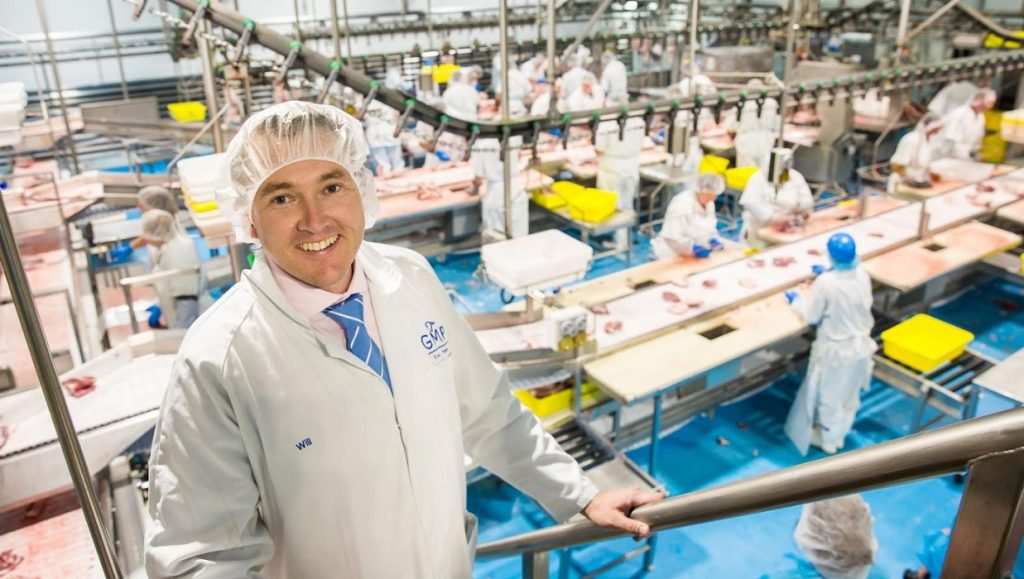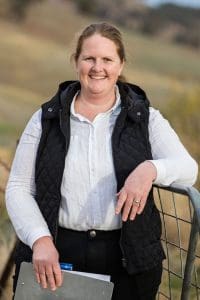
Gundagai Meat Processors CEO Will Barton: red meat processing about to be overwhelmed with the most extraordinary industry-changing data.
DEXA lamb carcase measurement will provide key animal welfare, health and production efficiency benefits to processor clients and farmers supplying lambs to Gundagai Meat Processors in New South Wales.
The GMP lamb plant at Gundagai is in the final stages of a $30 million expansion and expects to be able to process 4000 lambs a day by the end of next month – working toward a 40 percent production increase over the next five years.
The exclusively fee-for-service company recently employed leading meat scientist and educator Dr Michelle Henry as a key player in optimising the benefits of the expansion and new technology to its clients.
DEXA or Dual Energy X-Ray Absorptiometry units measure meat, fat and bone in a carcase. The technology’s incorporation into Australia’s red meat processing sector is being facilitated by Meat & Livestock Australia and peak industry groups, to help the supply chain improve on-farm and processing efficiency and deliver consumer-preferred products.
GMP chief executive officer Will Barton said GMP processes lambs for about six key clients. Supermarket Coles is the plant’s biggest client under processing agreements of five years-plus and a key part of GMP’s current and future success, he said.
“We are working really hard to develop relationships with some key clients who are not heavily exposed to seasonal fluctuations and aren’t heavily trade exposed.
“We are trying to find clients with end-customers who have fairly smooth demand through seasons and Coles is a good example of that.”
DEXA unit turned on by Christmas

Dr Michelle Henry
He said the plant’s DEXA equipment funding is MLA board-approved and he sits on the MLA commercialisation and adoption committee. He expected the DEXA unit to be turned on and running by Christmas.
Whereas some DEXA units will be situated before cutting robots in boning rooms, the GMP “hot-side” DEXA unit will be put at the end of the lamb floor, measuring fat, bone and meat percentage to help carcase optimisation and sorting.
“We will do it hot at the end of our lamb floor, which will mean at the time of slaughter we will be able to pair weight with percentage meat, bone and fat, as well as animal health data for each individual lamb carcase.
“So we will be able to say that for instance the incidence of pleurisy, arthritis or whatever it is, does or does not have a correlation with percentage fat cover and weight on an individual carcase basis,” he said.
“I think there will be a range of studies that can be validated by the data we start to collect.”
And this is where the strength and benefits of an appointment like Dr Michelle Henry will become apparent, to prepare and “humanise” feedback data for farmers and to maximise carcase cut value for plant clients, Mr Barton said.
“The red meat processing space is about to get overwhelmed with the most extraordinary industry-changing data, but I think there will probably be a dearth of people who are going to understand it and put it to good use.”
Dr Henry is filling the newly created role of client research advisor, advising on meat science issues to optimise the functionality of clients’ lamb supply chains, he said.
“Her appointment ensures that GMP is at the forefront of innovation in meat processing, by providing technical and research-based advice to clients regarding supply chain opportunities.”
Mr Barton said Dr Henry’s work will be of increasing importance to the business as advancements in technology necessitate an understanding of the science behind animal health and welfare, meat yield and eating quality.
“The ability to bring these elements together using DEXA technology and developments in carcase yield optimisation to provide meaningful outputs for our clients is viewed as a key factor in our ongoing success.”
DEXA and Dr Henry to give strong feedback to producers
Mr Barton said GMP will be able to give strong feedback to producers on terms of veterinary product use and Dr Henry will be able to extend so farmers can make good decisions about their production systems.
“But also, because we’ve got the DEXA at the end of the lamb slaughter floor, we will also use it to inform the way we sort carcases into our chillers to optimise the carcase outcome through the boning room.”
He said most boning rooms bone lamb carcases in groups, based on weight and fat score, but the objective insights from DEXA will enable GMP to make sortation decisions based on our clients’ needs.
“We will be able to tailor and apply our clients’ business rules in our chillers, sort and bone down to the level of maximising the value of cuts for various markets.
“We will become very targeted about the way we sort bone and pack our clients’ products.”
Mr Barton said Coles is heavily focussed on optimising lamb carcases through processing and another client, Arcadian Organic, who he expected will benefit from feedback generated by Dr Henry to farmers in veterinary product use and its impact on meat yield and management.
“Another corporate client we are talking who lambs around 130,000 lambs a year on their own portfolio of farms and Michelle will be very much focussed on educating their 20 farm manager across the eastern states of Australia on benchmarking across the group.
“Michelle in her discipline across animal, meat and education has a massive role across our business in offering a service of pairing with different clients with different needs to get good outcomes,” he said.
“I think that’s perhaps the one gap in meat processing at the moment, from a service delivery point of view, that we are going to get overwhelmed with data and we are going to need some bright minds to humanise it.”
Eating quality is the next step
By using DEXA to objectively quantify carcase makeup, GMP will then be in a position to incorporate into its meat processing system the “missing ingredient” – an eating quality measurement at chain speed, he said.
“I can’t stress the importance of that highly enough.
“I don’t really think that farmers will see a change in pricing signals until such time as we have the eating quality measure right.”
Dr Henry attracted by GMP vision
Dr Henry said it was GMP’s investment in its plant and people and its clear vision for its future that led her to join the business.
“I am excited to be joining a company that is taking real steps to lead the industry in animal and meat science.
“GMP’s vision and ethos is what first attracted me to the business; they are firmly committed to moving the business forward through exploring new technologies, partnerships and practices to improve their service delivery, food quality and add real value to clients,” she said.
Dr Henry has held previous roles at the Australian Lamb Company and the University of Melbourne, and is an active contributor to the Sheep CRC.

HAVE YOUR SAY